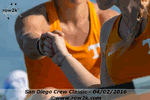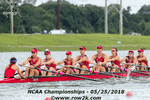Mental Health Part 2 - Habits and Lessons

Following the cancellation of the 2020 spring racing season, row2k solicited the collegiate coaching community to engage in a variety of high-level topics within the profession. We submitted over sixty questions across a dozen topics and thank the coaches and staffs that found time to contribute their thoughts during this stressful time.
This week we focus on the topic of Mental Health with the following questions:
HOW INVOLVED IS YOUR STAFF IN MAINTAINING THE OVERALL HEALTH OF THE ATHLETES AND DO YOU HAVE SPECIFIC WAYS OF ENCOURAGING HEALTHY SLEEP AND NUTRITION HABITS?
BART THOMPSON – ADRIAN
My assistant coach (as part of her contract) eats in the dining hall, and after practice often eats with the rowers. She has a degree in nutrition. So, having her present with the rowers during mealtime is helpful. We also make time for yoga, and stress not only its physical value, but also the mindfulness and meditation and relaxation aspects.
SANDRA CHU – WILLIAM SMITH
We are highly involved in a holistic approach to success which is anchored, in our program to a sleep schedule, good nutrition, hydration, recovery, injury management, time management, and academic success strategies. I would say that we talk about these issues every day, multiple times. We’ve produced on-line modules and infographics; we push podcasts on these issues as part of our Brain Endurance Training program; we have a student on our team who is paid to provide academic mentoring by our Center for Teaching and Learning; we work with students individually not just to create a time-management schedule but to also evaluate the success of their schedule until we are confident she has the skills to make an efficient schedule on her own. We also provide nutritional advice going so far as to educate the student based on her own dietary habits. If we didn’t do all of these things, our team’s athletic performance would suffer.
CAMPBELL WOODS – MARIST MEN
Kind of like team culture, this is an area where we can spend significant time discussing and explaining what needs to be done but it will ultimately come down to the athletes to get it done. Many of our SA’s live together and so when a guy is struggling in one of these areas, we will sometimes identify one of their friends to be a buddy and help bring them along.
BILL RANDALL – COAST GUARD ACADEMY
I wish I could say I was more successful in ensuring adequate sleep. I am certainly proactive in encouraging it. The start of almost every workout plan I send to my athletes starts with, “1. The Watch words are – HYDRATION, NUTRITION, SLEEP (drink plenty of water, eat healthy, and get your sleep),” and I make periodic checks with my athletes as they enter the boathouse. I have considered having them log their sleep, but that would add an additional task to an already over-burdened schedule. I know this is not a problem that is limited to just the US Coast Guard Academy. It was a problem when I coached at a Science and Technology High School too, and I assume it is true at many colleges and high schools. American’s just do not believe they need 8+ hours of sleep even though there is qualitative evidence to support that they do.
A great resource is the book, Why We Sleep, by Matthew Walker PhD. Borrowing from the web site that was advertising the book, “Sleep is one of the most important but least understood aspects of our life, wellness, and longevity, compared to the other basic drives in life; eating, drinking, and reproducing, the purpose of sleep remained elusive.”

An explosion of scientific discoveries in the last twenty years has shed new light on this fundamental aspect of our lives; we spend nearly 1/3 of our lives doing it. Matthew Walker gives us a new understanding of the vital importance of sleep and dreaming. Within the brain, sleep enriches our ability to learn, memorize, and make logical decisions. It recalibrates our emotions, restocks our immune system, fine-tunes our metabolism, and regulates our appetite, not to mention; improve our athletic performance!
JENN LANGZETTEL – DUQUESNE WOMEN
We do our best to give as much guidance as we can and offer workshops and presentations on areas of sleep, nutrition, time management, and mental health. From there we look to the team to keep an eye on each other and bring concerns about any individual to the attention of the captains first and then the coaches or relevant staff if need be.
IN WHAT WAYS DO YOU THINK COLLEGIATE ROWING HELPS STUDENT ATHLETES BE SUCCESSFUL IN ALL ASPECTS OF THEIR LIVES?
JOHN BOYD – IONA
Rowing teaches you most about yourself and your own limitations. Personally, I think collegiate rowing sets the bar for which other aspects of your life can be measured against.
JENN LANGZETTEL – DUQUESNE WOMEN
College rowing teaches a lot of discipline, time management, and camaraderie as well as teaching women a lot about themselves and what they can accomplish. We are up early every day almost all year, they are being pushed to the limits physically and mentally. They learn that they can really achieve more than they thought was possible and that will help them immensely in so any other areas of life.
CAMPBELL WOODS – MARIST MEN
The obvious skill here is teamwork of which rowing is probably the best possible teacher. I think that rowing teaches us how to work hard for long periods of time without any light shining on the results. It teaches us how to take failures and learn from them and it teaches us to take responsibility for those failures when they happen. It teaches us to be self-sufficient but not selfish, proud but not arrogant, and how life is not about the destination but the process. I can’t say enough!
BART THOMPSON – ADRIAN
There isn’t much that’s harder than training for rowing. It gets you out of bed early quite often. It also emphasizes the value of the team more than any other sport, plus it certainly keeps you fit. So, I think all of those things are valuable: the work ethic, the regimented schedule, the emphasis on team above self, and the physical fitness.
SANDRA CHU – WILLIAM SMITH
Rowing teaches students that there are no shortcuts. To be fast, you must do the work. To do the work you must make choices that might be less convenient, but which pay off in the end. Rowing teaches you how to risk and how to fail. It teaches you how to work with a diverse group of people, to put others before self, and to be hungry for physical and mental challenges that seem other worldly to those who do not row. It teaches you that the only limit to your success is the choice not to try.
If you enjoy and rely on row2k, we need your help to be able to keep doing all this. Though row2k sometimes looks like a big, outside-funded operation, it mainly runs on enthusiasm and grit. Help us keep it coming, thank you! Learn more.
Comments | Log in to comment |
There are no Comments yet
| |
- Bont Rowing
- Calm Waters Rowing
- Concept 2
- Craftsbury Sculling
- The Crew Classic
- CrewLAB
- Croker
- Durham Boat Co.
- Empacher
- Faster Masters
- Filippi
- Fluidesign
- h2row.net
- HUDSON
- Live2Row Studios
- Nielsen-Kellerman
- Oak Ridge RA
- Peinert Boat Works
- Pocock Racing Shells
- Race1 USA
- RowKraft
- Rubini Jewelers
- Vespoli USA
- WinTech Racing
- Bont Rowing
- Calm Waters Rowing
- Concept 2
- Craftsbury Sculling
- The Crew Classic
- CrewLAB
- Croker
- Durham Boat Co.
- Empacher
- Faster Masters
- Filippi
- Fluidesign
- h2row.net
- HUDSON
- Live2Row Studios
- Nielsen-Kellerman
- Oak Ridge RA
- Peinert Boat Works
- Pocock Racing Shells
- Race1 USA
- RowKraft
- Rubini Jewelers
- Vespoli USA
- WinTech Racing

















